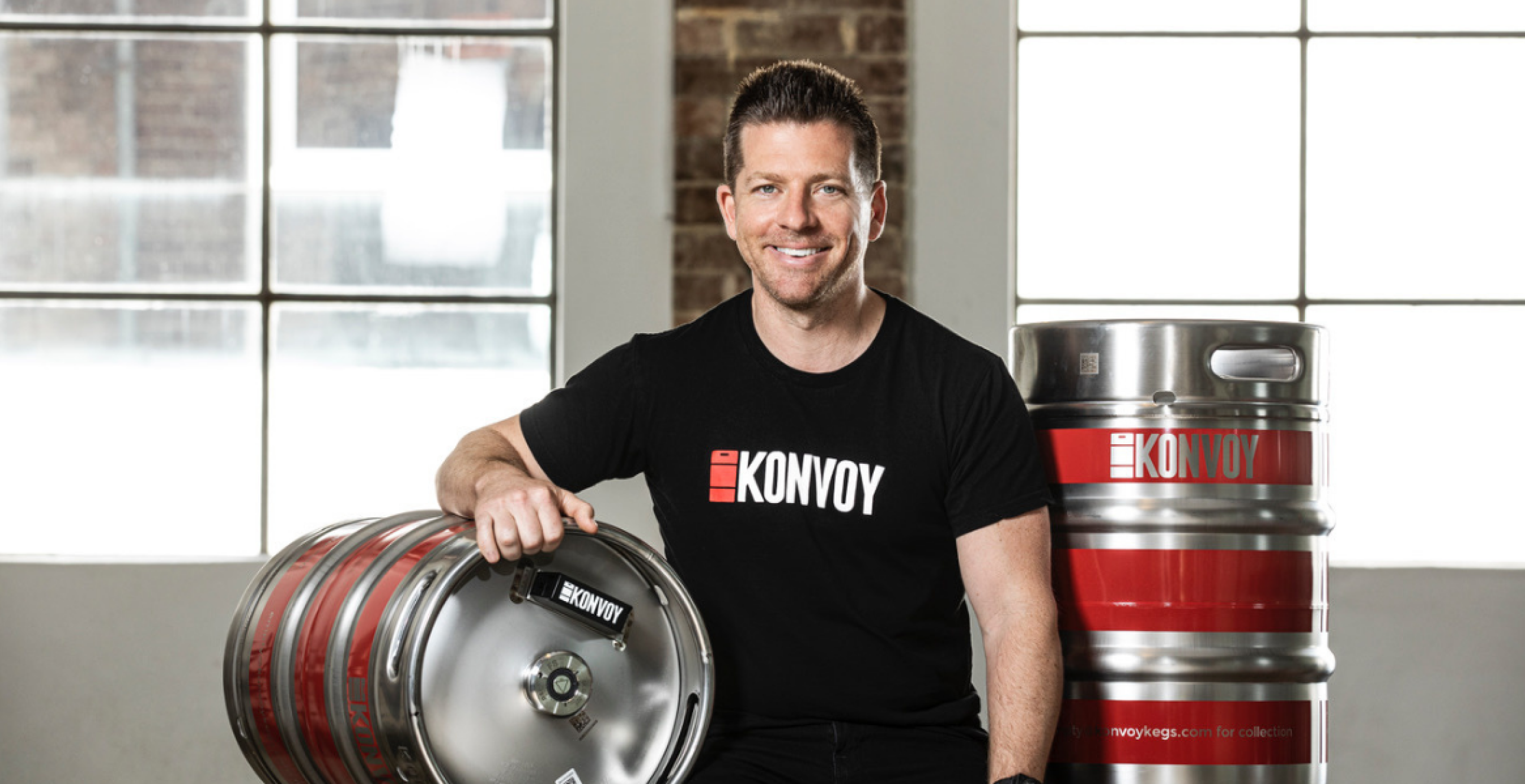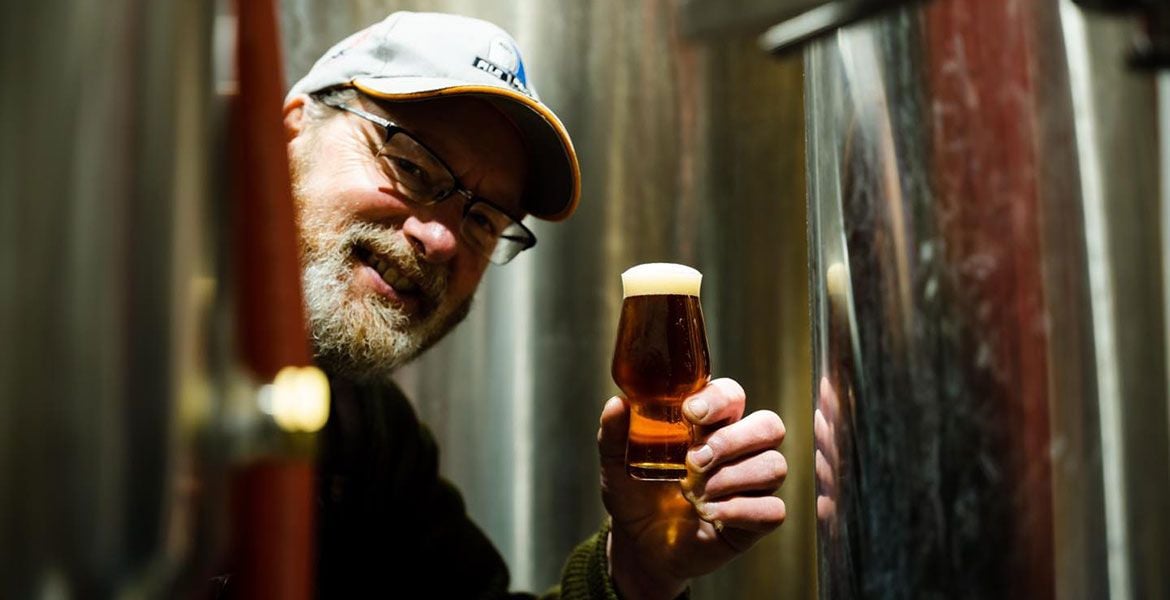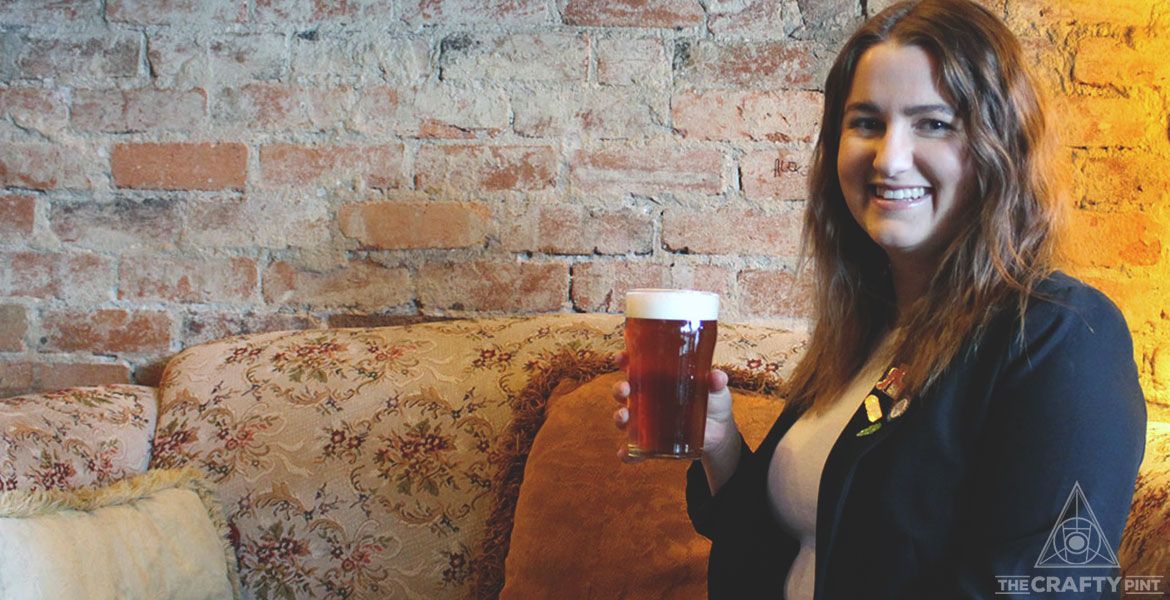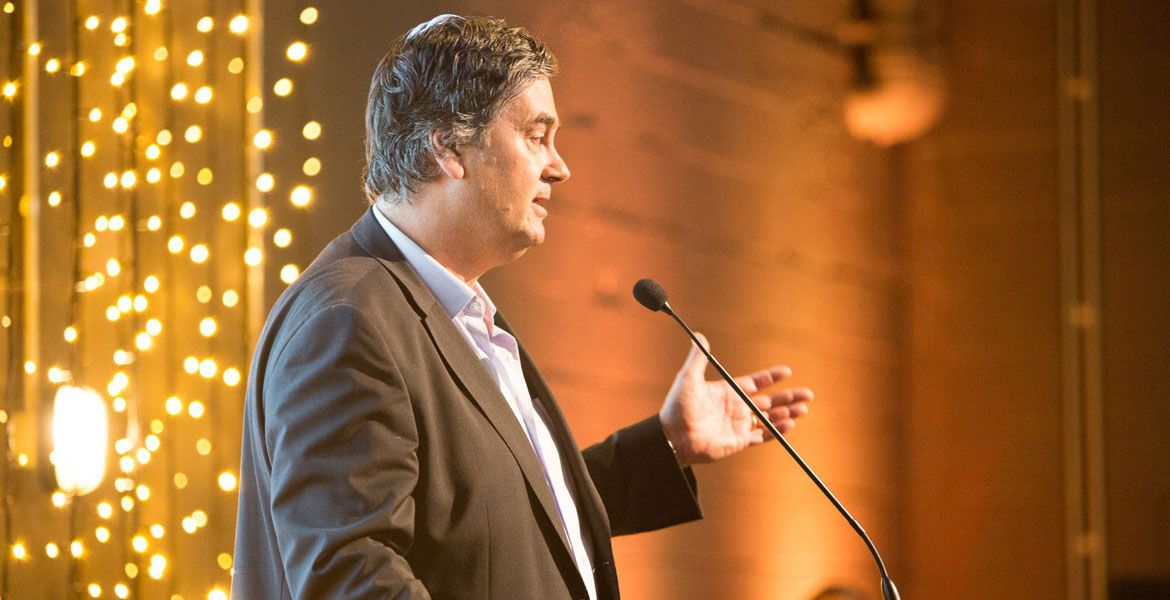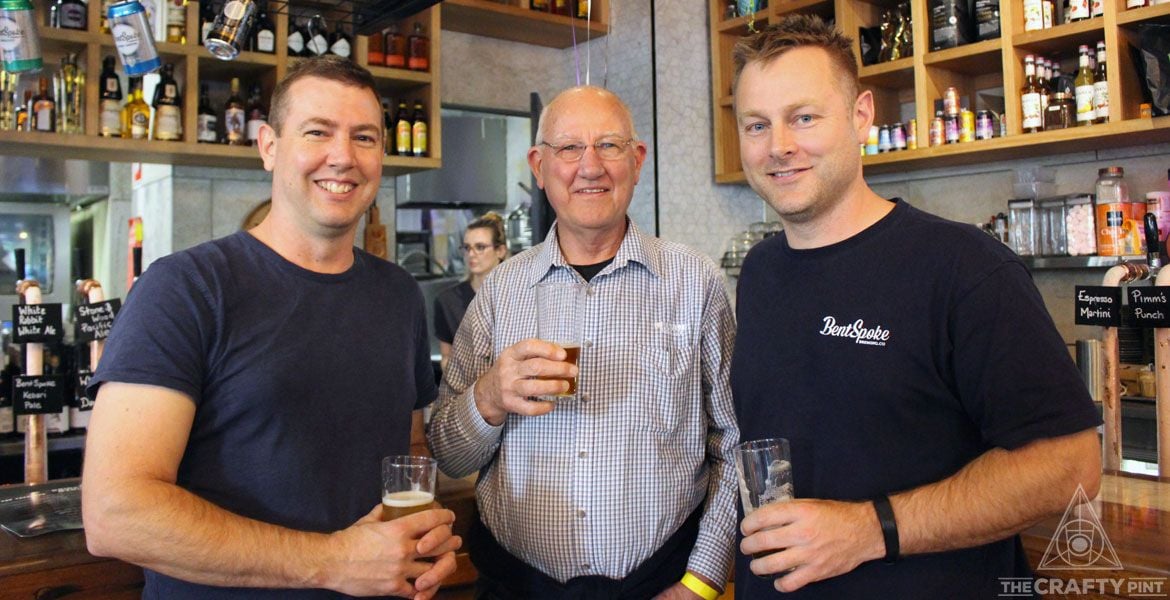Adam Trippe-Smith’s greatest contribution to the beer industry started with a plastic keg exploding in a storage yard in western Sydney.
You may not have heard of Adam – or ATS as he's known to most in the industry – even if you know a bunch of Aussie brewers. But Adam’s not a brewer. He’s a doer.
He co-founded McLaren Vale Beer Company (now Vale Brewing), which went from zero to a million litres of sales in two years flat. He was a founding board member of the Craft Beer Industry Association (now Independent Brewers Association). He founded Kegstar, a keg rental company that now manages over half a million kegs across three continents. He co-founded Riot Wine Co, Australia’s first company to focus on kegged wine. He founded Konvoy, a keg rental company that automatically tracks the location and temperature of kegs. And he’s a co-founder and key shareholder in White Bay Beer Co.
When he talks about his part in these businesses, Adam often insists on using words like "co-founder", "involved with" and "invested in". Ask him about them, and he’ll keep directing your attention to the others involved.
But it’s not a coincidence that he’s there at ground zero of all of these ventures. He’s not a lightning rod for successful businesses; he’s not just lucky enough to be in the right place at the right time; he’s not someone who just throws money at businesses and expects others to do the work.
He’s more like the one who sets the wheels in motion: he sees a problem, decides to solve it, then pulls the right people together. He’s like Gandalf in The Hobbit, setting the agenda for the adventure, getting the team together, doing the heavy lifting at key points, then disappearing into the background.
When Adam Trippe-Smith sees a problem, he doesn’t say: “Someone needs to do something about that.” He says: “Let’s do it.”
FROM THE VALE TO THE STARS
Adam’s story in the craft beer world began in 2007 when he looked around and wondered why McLaren Vale didn't have its own beer brand. It was already known for good food, good wine, and good beaches. It seemed obvious to Adam that it should have good beer. So he decided he’d be the one to bring it.
He’d never started his own business before. But his previous life in finance and corporate strategy had given him insight into the world of entrepreneurs; he’d been looking for an opportunity to step out of the corporate world and do his own thing.
He only lived in McLaren Vale part-time, living the rest of his time in Sydney. But he’d loved McLaren Vale for most of his life.
He had no credentials or contacts to speak of in the brewing industry. But he’d been watching the US brewing scene – “I was fascinated by the new segment. There's something exciting happening, it’s kind of artisan.” – and had an idea where the Aussie scene was going.
He had options: wait for someone else to start a McLaren Vale beer brand; play it safe, spend years building up brewing skills, slowly make connections in the industry, raise capital for a brewhouse, perhaps shift his whole life to McLaren Vale. Or he could get in and get things done.
He started McLaren Vale Beer Company.
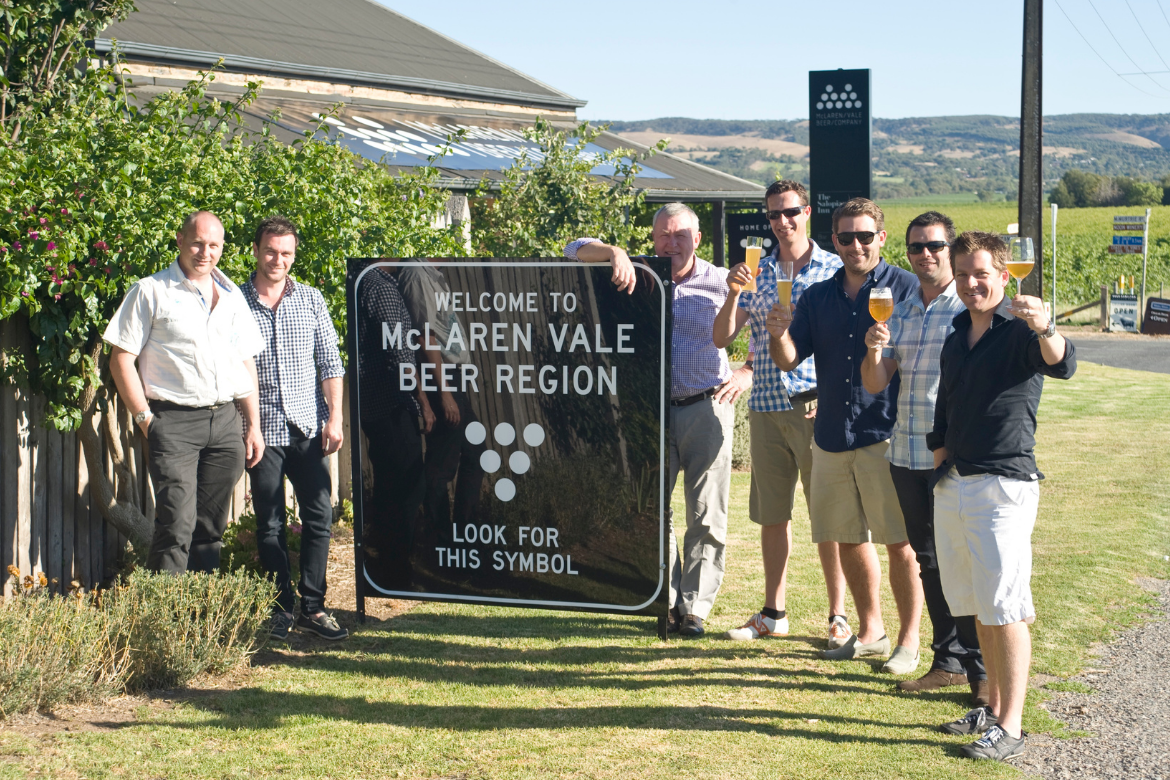
The plan: to contract brew and launch a brand with a single beer: Vale Ale. The goal wasn’t to out-craft the craft beers already in the market, but to be a gateway beer with a contemporary design – an easily recognisable and attractive alternative to mainstream macro beers.
For a year, Adam toted four-packs of Vale Ale samples to bars in South Australia and Sydney. In his head he had three questions: Could he sell beer? Would people buy into the Vale Ale brand? Was he right about the beer industry in Australia following the US?
“Ticked the box on all three,” is how he puts it.
The ensuing years saw Adam build a team, acquire a hospo venue, and start work on a brick-and-mortar brewery nearby. And, with a different feel to other craft beers, a loyal following in its corner of the world and some savvy marketing, Vale Ale took out first place in the 2011 GABS Hottest 100.
But commuting interstate every week had worn Adam down, so he decided it was time for him to sell most of his share to the other shareholders and move on.
THE ROOM WHERE IT HAPPENED
In his time at McLaren Vale, Adam had been part of the uphill battle that all small brewers faced. And he’d seen the positive impact the Brewers Association had in the US.
“The collegiate nature of breweries working together as one to effectively compete against macro or mainstream beer was very powerful,” he says. “They’re clearly competing against each other as well … but, as a group, I could see the benefits of having that body to bind everything together.”
Adam wasn’t the only brewery owner who saw the need to grow the craft segment in Australia. But while many recognised the need for a brewing association, and were waiting for someone to do something … Adam didn’t believe in waiting.
“No one was going to do it for us. It was going to be really hard.”
Adam brought together senior figures from breweries around the country – Brad Rogers and Jamie Cook (Stone & Wood), Brendan Varis (Feral), Dave Bonighton (Mountain Goat), Miles Hull (Little Creatures), Owen Johnston (Moo), Bruce Peachy (consultant to many) – as well as David Cryer, then head of the Brewers Guild of New Zealand, for his experience and input, and Matt Kirkegaard of Brews News, to observe and offer his helicopter view of the craft beer industry.
They sat in a room with a whiteboard and said: “We’re starting an industry association here today.”
Adam was only part of the Craft Beer Industry Association for five months, until he was no longer attached to Vale. But that day led to what is now the Independent Brewers Association, which has gone on to run the BrewCon conference, Good Beer Week, and the Indies beer awards, while advocating for the country's indie brewers.
“My part was calling that meeting,” Adam says.
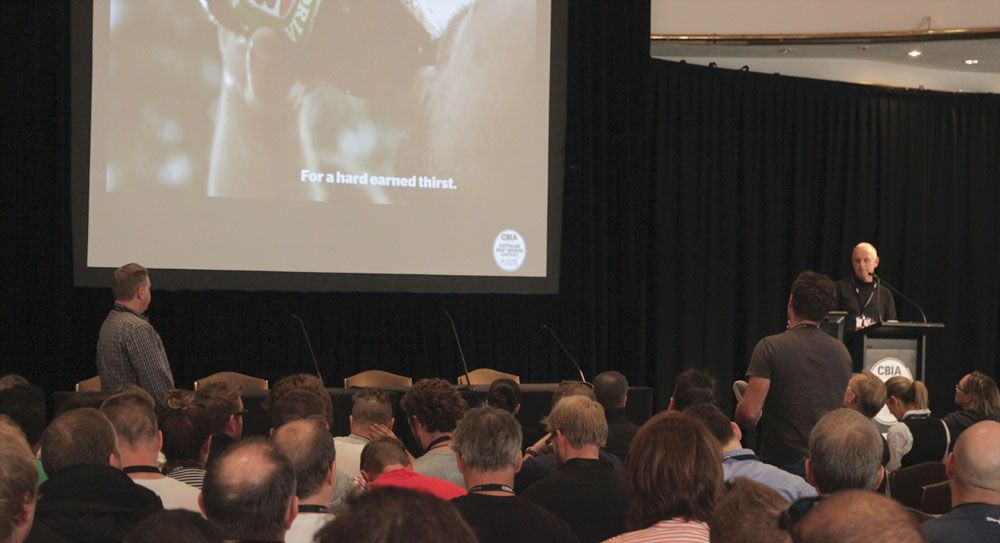
IT STARTED WITH A BANG
Now back to that exploding keg.
In the lead up to exiting McLaren Vale Beer Company, Adam’s loose plan had been to take a few months off then start a brewery – this time with a commute of less than a thousand kilometres. But before he got to that, he noticed a more pressing need: the Australian craft beer industry had a keg problem.
As a small startup, McLaren Vale had begun with plastic kegs – it was relatively cheap to buy a pallet of 36 and get started straight away. But Adam quickly found that, although plastic kegs were marketed as disposable and recyclable, pubs would still call the brewery to come and collect the empties; they were far from hassle-free.
Then one day a returned empty keg, still pressurised, exploded in the heat. Thankfully, no one was hurt – a couple of similar incidents in the US had resulted in deaths – but it was enough to turn Adam off plastic kegs, and he immediately ordered a container of stainless steel kegs from the States. A container of 880 kegs cost around $100,000, however, and took at least three months to arrive; a lack of kegs quickly became a bottleneck to growth.
From talking with others in the industry, he knew most small breweries were facing the same problems, and shared his frustration there was no easier option.
Then, on a trip to America, Adam heard about Microstar, a keg rental service company. Adam had talked to other brewery owners, and knew they were all waiting for a solution like Microstar to come to Australia… but Adam didn’t believe in waiting.
“Clearly, no one else was going to have a crack at solving this keg problem,” says Adam. “So I thought I’d try it before I started a brewery. Wasn’t going to die wondering.
“Much to my wife’s disgust, I spent our last hundred thousand dollars to buy a container of kegs.”
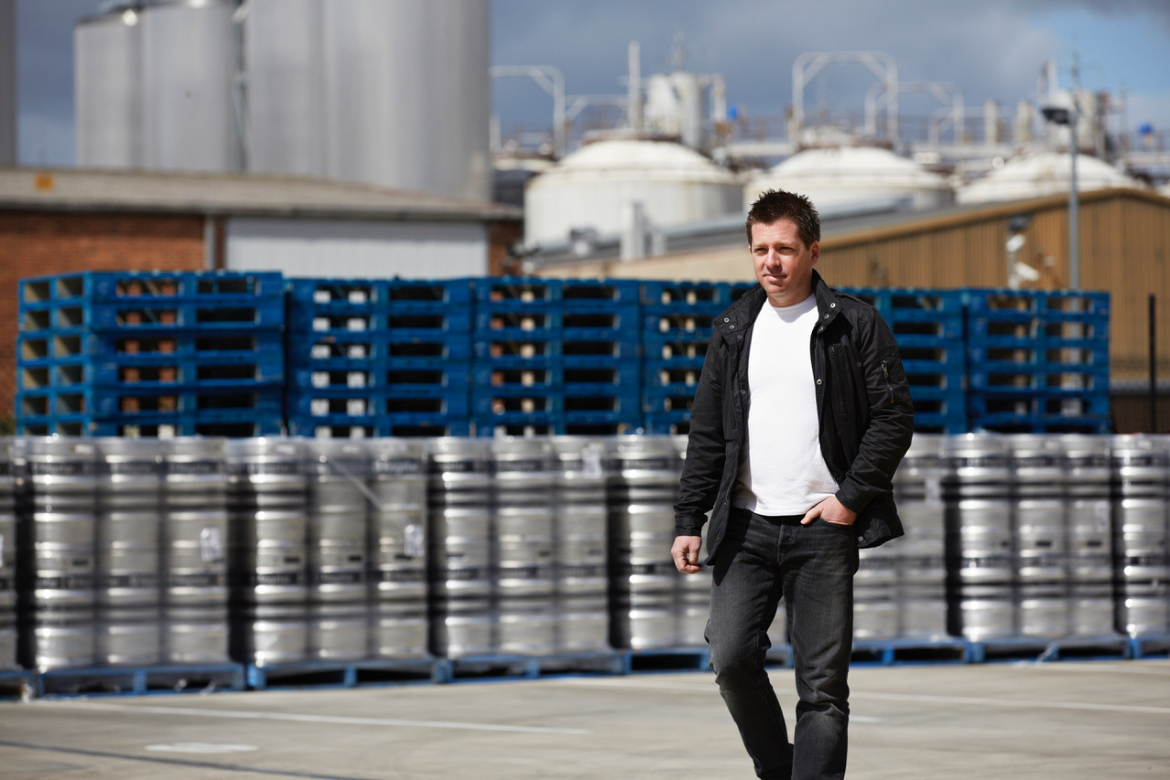
He emailed every brewer he knew in Australia to say he had 880 kegs available for rent, and Stone & Wood replied saying they were desperate for kegs, and immediately snapped up half of them. Kegstar was born.
One-way keg rental is a simple but effective service. Kegstar rents empty kegs to a brewery; the brewery fills them and delivers them to venues; Kegstar collects the empties, and they’re available to be rented back to breweries. The result is that breweries don’t need to fork out for their own fleet of kegs, don’t have to keep track of and collect hundreds or thousands of kegs, don’t have to suffer the costs of losses, and don’t have to spend half their time hauling empties back to headquarters.
Nine months into the Kegstar journey, with a second shareholder, a fleet that had swollen to 2,500 kegs, and a number of customers who were wholly reliant on Kegstar for their keg needs, it was clear to Adam he needed an injection of capital.
For long-term investment, there seemed to be one obvious place to turn: Brambles, a global supply chain logistics and reusable container company. Over two years, Brambles invested as needed until it became the full owner of Kegstar, which now serviced 140 brewing companies across Australia and New Zealand with a keg pool of more tham 50,000 kegs.
Adam and his hand-picked team stayed on and Kegstar thrived, expanding into the UK, mainland Europe and the US. But, in time, Adam became restless. He’d always said to his team he’d leave if there came a point where he could no longer influence the outcome or running of Kegstar, and that point came.
Big ships are hard to turn, and so in 2018, with Kegstar’s course firmly set, it was time for Captain Trippe-Smith to move on.
(Adam also co-founded Riot Wine Co during the tail end of his time at Kegstar, but that’s a topic for The Crafty Pinot…)
GET TRACKING
When Adam entered the beer industry in 2007, he had no special industry knowledge or contacts. But, by the time he left Kegstar in 2018, he knew the inner workings of small breweries, had relationships with brewers around Australia, and was an expert in keg rentals and logistics.
The goal was to take six months off to clear the brain and figure out what to do next. He took two-and-a-half before he was brainstorming what he’d do differently if he were to design a new keg rental company from scratch.
When Adam sold Kegstar, he had no intention of starting a competing company; far from jumping ship, he’d kept managing Kegstar well beyond the duration of his non-compete clause. But he’d been telling his team at Kegstar for years that it was only a matter of time before a second player entered the game.
Now he thought: who better to be that second player than him?
“We could do all the best things and drop all the worst things,” he says.
That’s how it came to pass that Adam started not one, but both of the leading keg rental companies that drive the Australian craft beer industry.
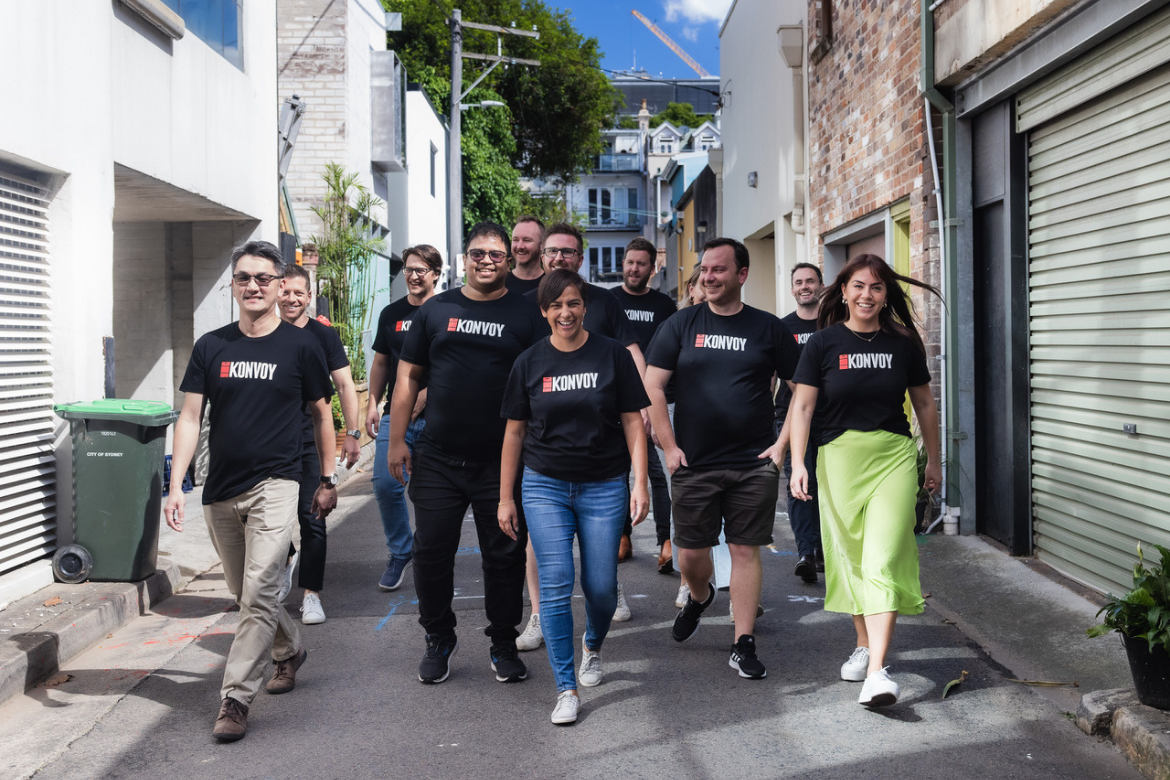
When he started Kegstar, tracking technology had been prohibitively expensive, but now tech advancements had brought it within his reach. Adam saw the chance to fit a fleet of brand new kegs with tracking technology that was previously unexplored in the world of keg rentals.
There was also a ready-made dream team available to him. Adam knew three of the people he’d employed at Kegstar (Nick Becker, Patrick Hanrahan and Marc Eggins) were looking to move on, so he snapped them up. Together they could take a running start as a lean team who already knew the game.
From this position of strength, Adam started Konvoy, the company that would roll out the first keg fleet in the world to be fitted with tracking devices.
While the beginning of Konvoy was similar in some aspects to the beginning of Kegstar – “Same fun. Same nervousness. Same sleepless night. Same fuck ups.” – there were three key differences that excited Adam.
In the early years of Kegstar, Adam and his team had needed to spend time and energy carving out a new segment and explaining to brewers how keg rental worked. But, for Konvoy, the market was already ripe.
Secondly, the scale was different. With the market ready to go and Adam’s experience raising capital, Konvoy didn’t begin with 880 kegs; it started with almost 40,000 (and, at time of writing, this number has already multiplied a few times).
And, thirdly, the tech was better.
“In a world where beer is unpasteurised and should be cold, we can provide quality control alerts – either too hot or too cold – to anyone who rents a keg from us,” Adam says.
Fitting high-tech, industrial grade, Kegfox tracking beacons to tens of thousands of kegs isn't cheap, but Adam says it's well worth it.
“It helps us run our fleet better, which ultimately keeps prices down.”
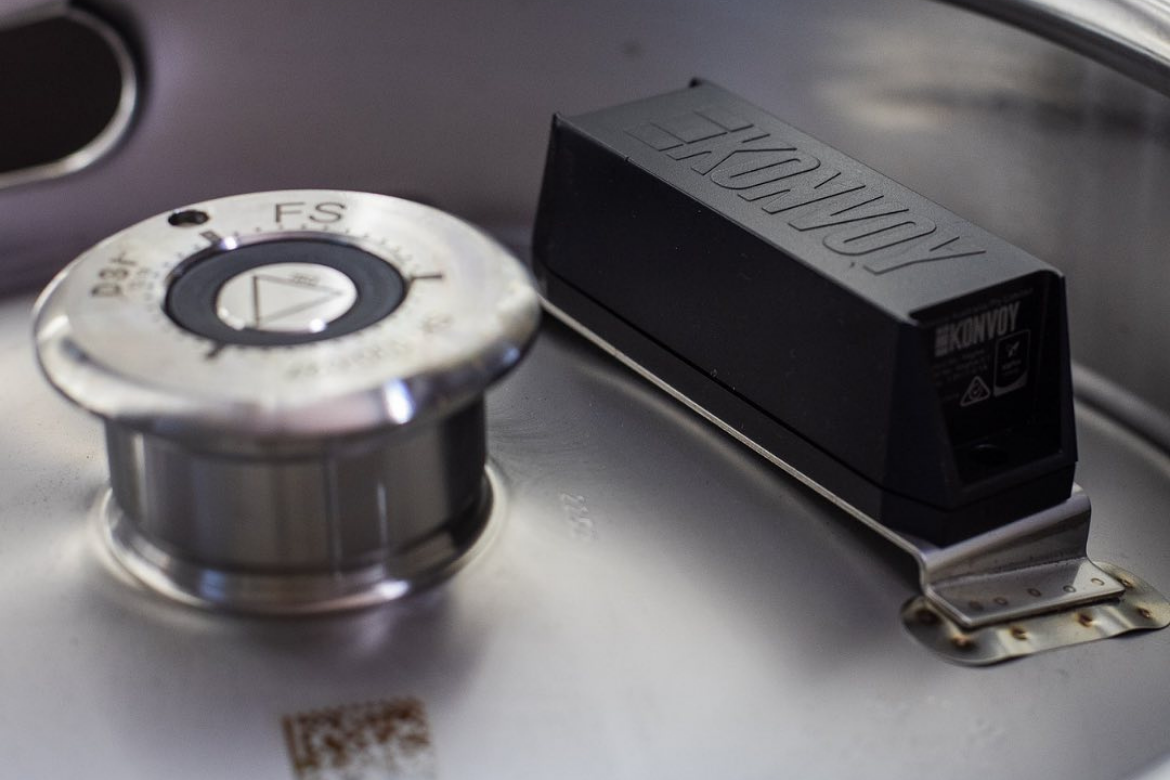
By starting another company – Katch Asset Tracking – Adam has made the Kegfox beacons available for others to buy, while the Konvoy Group has also acquired Keg Services, Australia’s only keg repair and maintenance facility.
"The world will always have keg owners,” Adam says. “You’re never going to have a world where everyone’s renting kegs from a few rental companies. And so, if we’re not trying to help those keg fleet owners run their keg fleet better, someone else will.
“For us, it’s vertical integration: Keg Services repairs kegs, and also sells them; its sister company Konvoy rents them; its other sister company Katch tracks them.”
This kind of catch-all simplicity involves a lot of hard work behind the scenes, and Adam can’t praise his team highly enough for that – he talks about his team members like he’s just lucky to have them around.
“Nick Becker there – feels like he’s been around [the industry] forever. Tom Madams – he’s certainly been around it forever! Fraser, our head of customer service … probably every brewery in the country has spoken to Fraser at some point in time, and loves him.”
But luck has nothing to do with it; these people make up Konvoy because Adam asked them to join him.
“I’ve found a skill set in rallying people around me to start something. And as I go I’m getting better at bringing in the right people around me to then run it, so I can keep throwing energy at it to grow.”
BRINGING BEER TO WHITE BAY
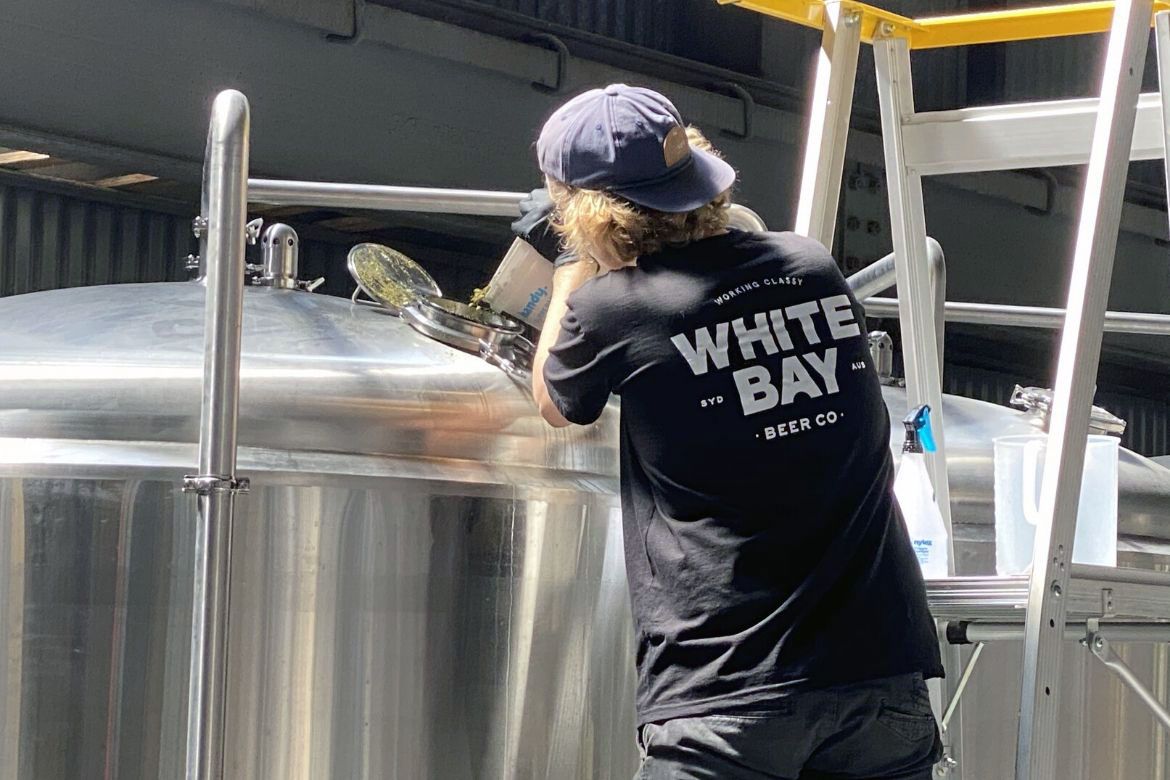
While kegs are the centre of Adam's world, they're a means to an end: moving beer.
Ever since he left McLaren Vale Beer Company at the end of 2011, Adam had wanted to get involved with a Sydney brewery; it took him almost a decade, but he finally got there – he's part of the team that started White Bay Beer Co on the Balmain Peninsula.
Adam's not the main face of the business, but even being a part of a brewery has brought him back into the creative and collegiate side of the industry – the fun side.
“When you’re a supplier, you're always on the other side of the fence. And we need all our suppliers! But ultimately the ones playing the game are the producers in my view.”
Adam and his family live in a house looking over White Bay (the body of water) and his wife grew up on the street where the brewery is now located. So, while Adam’s spent the last decade helping people send their beer around the world, his interest in White Bay Beer Co is about bringing beer home.
“I've driven past those warehouses forever, thinking one day someone's gotta stick a brewery in there.
"White Bay was a chance for me to invest again, help get it up and running, and then I just want to be a pain and rock up and be a customer and drink there on the way home.”
Adam Trippe-Smith may do things differently to many of us. But dropping into your local, where they know you, and having a beer at the end of the day … isn’t that what we all want?
You can check out our Craft Beer Heroes series here.

